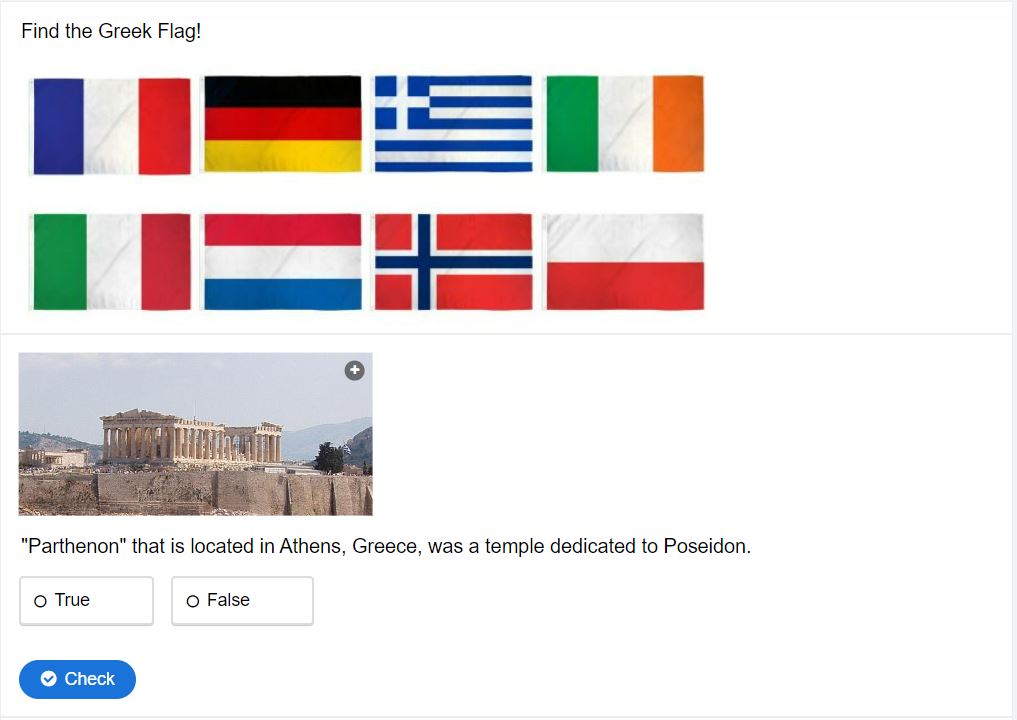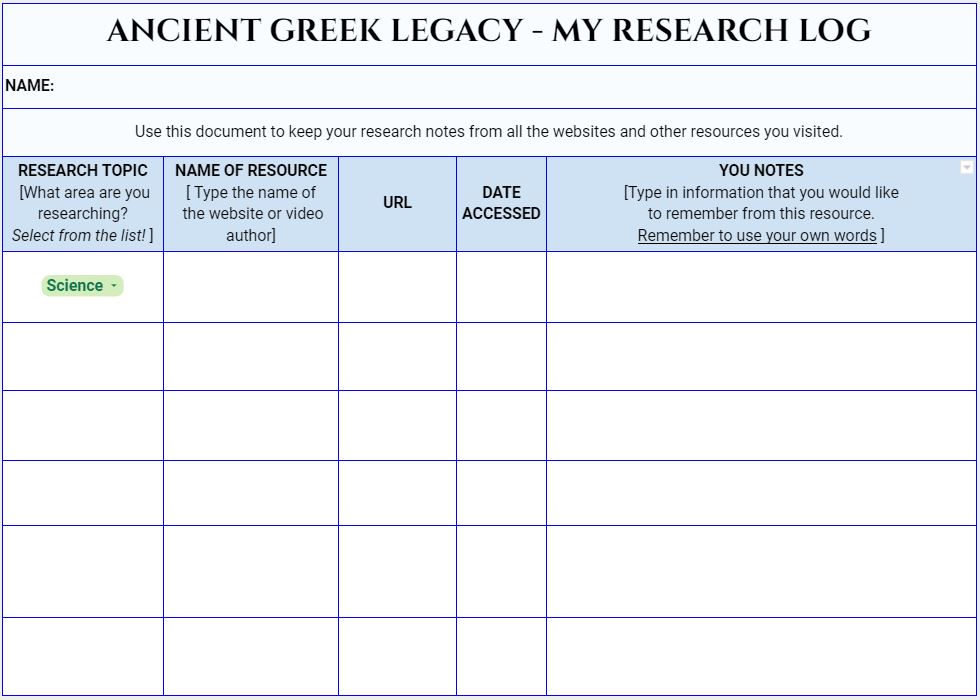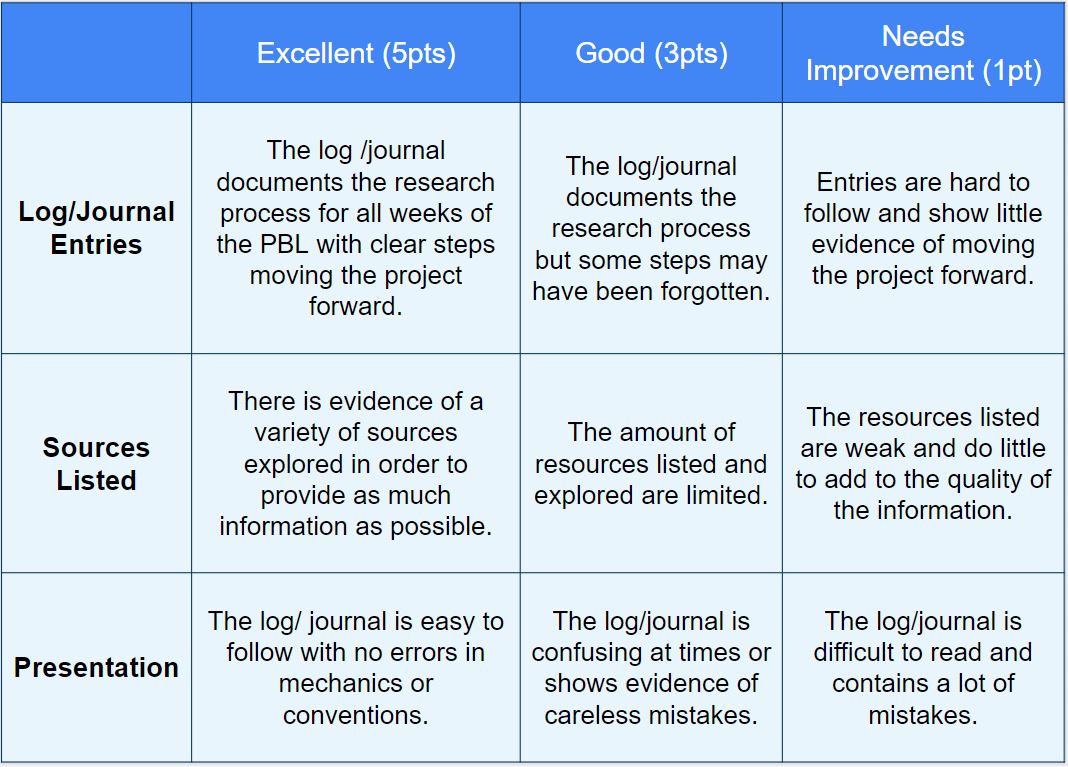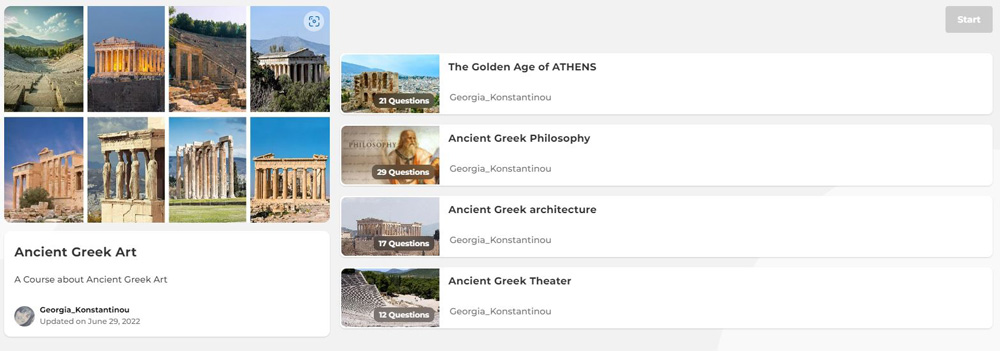Formative Assessments
Pre-research Stage
Pre-Assessment: Students complete a pre-assessment prior to the introduction of the unit. This small evaluation can help the teacher determine what the students already know and in what he/she should focus on more.
H5P formative assessment: Following a brainstorm session / discussion with the whole class and an introductory lesson about Greece, students complete an H5P formative assessment (sub questions 1-3).
Research Stage
Research log / journal: Students keep a research log throughout the 6 weeks of the project. Alternatively they can use Penzu to keep their notes. At the end of the research phase, their research log is assessed based on this rubric.
Science Quizlet and/or Blooket about ancient Greek Math, Astronomy and Medicine: Students research these topics and update their research log with the information they have found. At the end of this research week, the whole class plays a Quizlet and/or Blooket game to review and assess their knowledge.
Art Kahoot Course about ancient Greek theater, architecture, philosophy and the Golden era of Athens: Students this week research about ancient Greek achievements in architecture, theater, and literature. They update their research log with the new information. The entire class participates in Kahoot games relevant to the specific topics at the conclusion of the research week.
Olympics Games Kahoot: Students research about the ancient Greek Olympic games, the sports they included, where they took place, etc. At the conclusion of this unit, they play a review game of Kahoot as a class.
Government & Legal System Bamboozle: Students research about the birth of ancient Greek Democracy and the judicial system of classical Greece and then they play a game of Bamboozle as a class.
Visit & Talk
VoiceThread discussion: Students visit MET’s online exhibit “The Art of Classical Greece“, brainstorm and come up with questions for their upcoming visit to the Metropolitan Museum of Art. Their questions should focus on the art of that era, the different types of vases (amphora, pyxis, krater etc.), the artists and the techniques of vase painting.
Groups & Fair Exhibit Idea
After the visit to the MET, students are placed in groups based on their choice of topic. Possible choices include Science, Painting & Sculpture, Literature & Theater, Architecture, Political System, Sports, and Law. Each group member commits to make every attempt to collaborate and signs a team contract.
Each group must settle on an exhibit and make a convincing Flipgrid video about their fair display proposal. They discus within their groups and choose the best way to convey what they have learnt about their specialized topic. They have to create a 2min video presentation in which they present to their teacher and the rest of their classmates their idea and how they will develop it. Their idea should be clear, spark curiosity, encourage inquiry, be approachable to people of all ages, reflect the subject they were researching, and allow visitors to leave their booth knowing more. They have to be convincing. They will proceed with their idea, if they manage to get their teacher’s approval and the approval of at least three of their peers from the other groups.
Summative Assessments
Exhibit for school fair: Each group will construct an exhibit for the school /community fair (they have to get approval first – please, look above “Fair Exhibit Idea”). Possible ideas include, but not limited to, philosophical debates, Greek plays/skits inspired by the Ancient Greek literature, constructions (ancient temples, theaters, buildings, sculptures etc.), ancient Greek inventions, Greek inspired Olympic games, role playing scenarios and simulations, interactive displays and presentations, etc. Their exhibit will be evaluated based on this rubric. Additionally, the teacher will hold a “gallery walk” where each group will evaluate the exhibits of two other groups (peer evaluation) and make suggestions on how to improve them.
Essay about their special topic (Science, Painting & Sculpture, Literature & Theater, Architecture, Political System, Sports, Law): Students write an essay about their special topic as a group. Each member of the group is responsible for a specific portion of the essay. Their essay will be evaluated based on this rubric. Also, each group will use the rubric to evaluate the essay of two other groups assigned by their teacher (peer evaluation /”gallery walk” – different groups than before).
[ The aforementioned peer evaluations allow students to broaden their knowledge and experience on subjects that they didn’t have the opportunity to explore in-depth on their own. ]
Flipgird video presentation: students are asked to create a Flipgrid video presentation about their exhibit for the community members that could not attend the school fair. Their Flipgrid video presentation will be published on the school’s website and evaluated based on this rubric.
Self & Peer evaluation of team work: Students will evaluate themselves and their team members for their group work.
Students’ Reflection: Students are asked to reflect on the project they completed. Reflective writing gives students the chance to analyze their educational experience, incorporate it, and make it pertinent to their personal needs. Their reflection should fully address the reflection questions (credit PBLworks) that have been given to them and should also go through how the readings, assignments and material in this project relate to their personal goals/needs.




